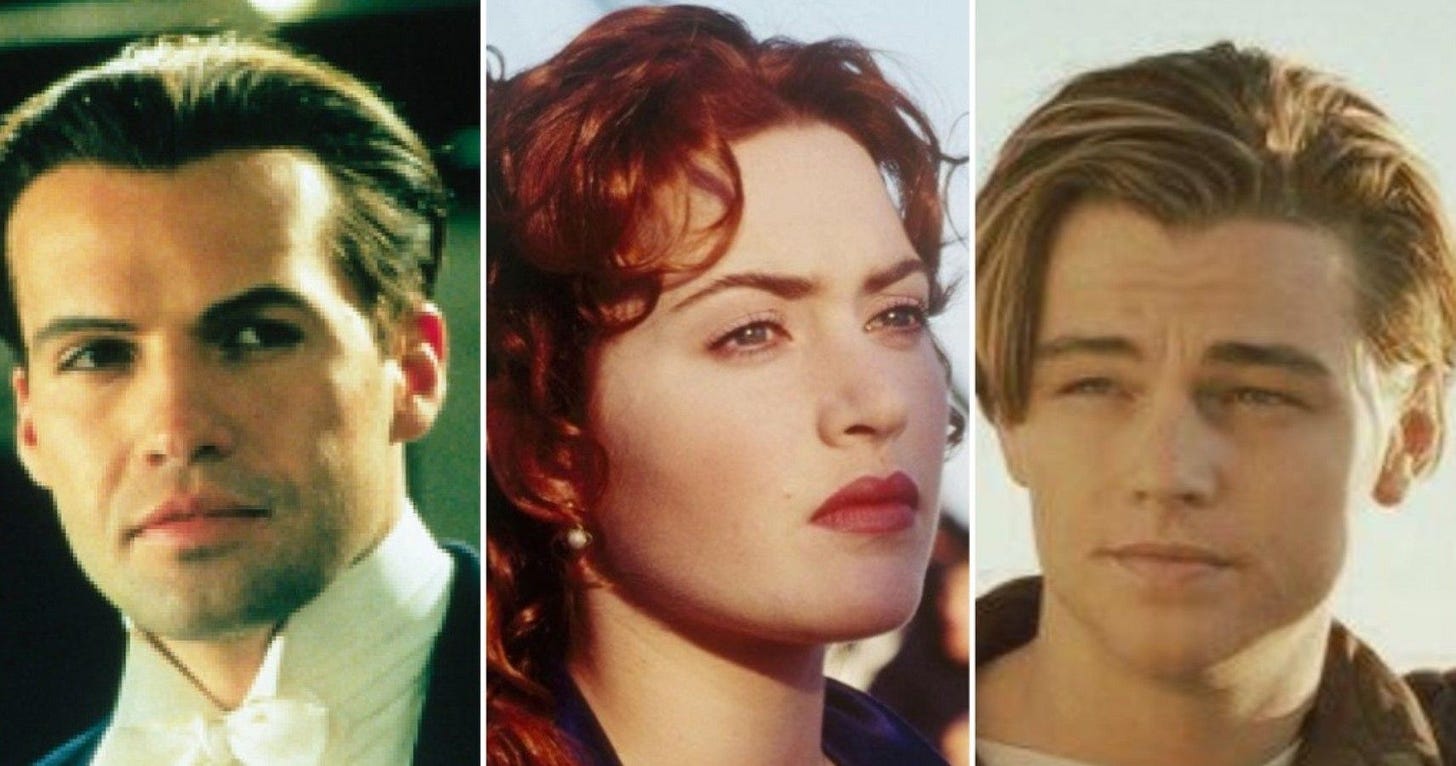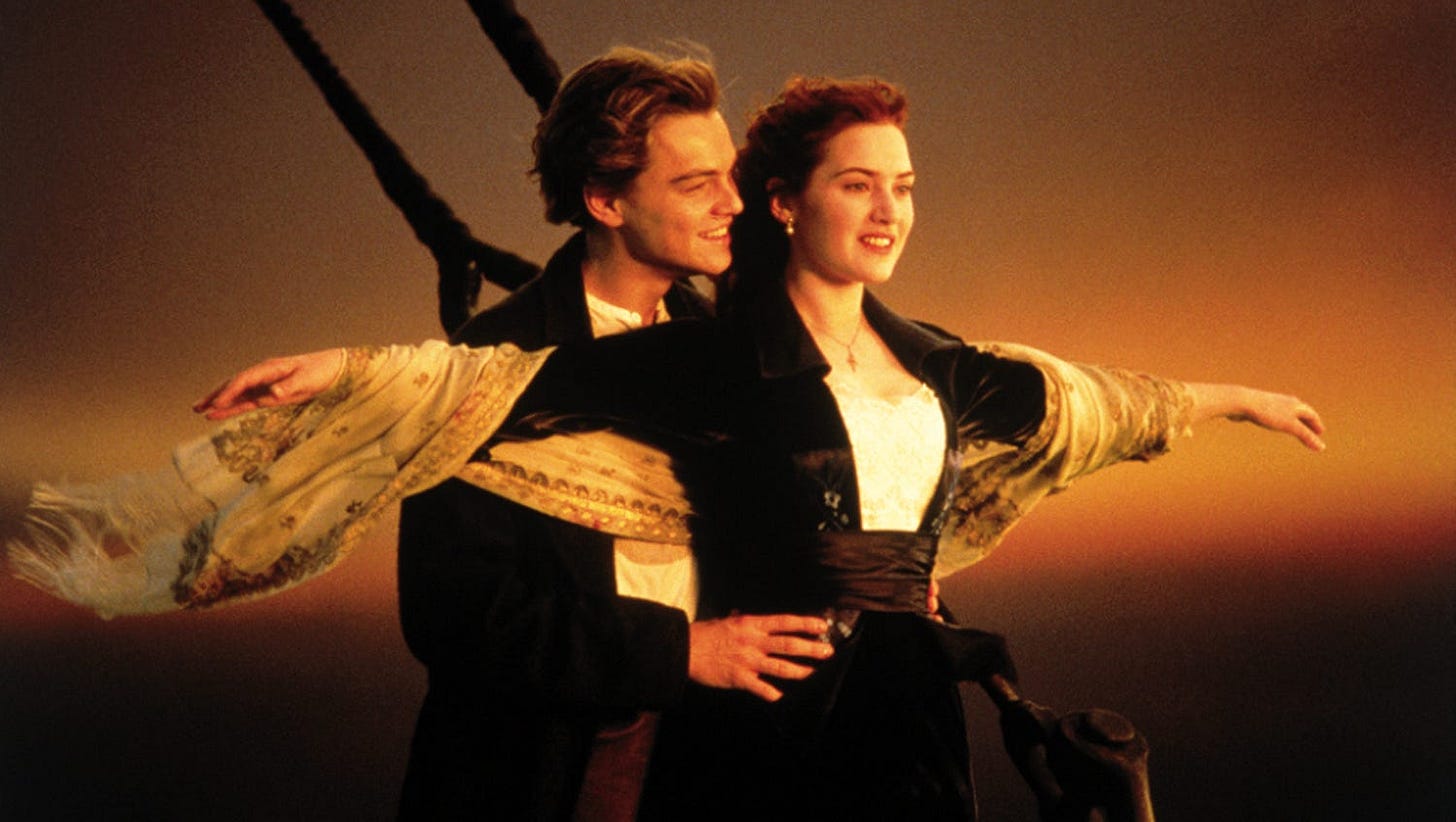Rose and Jack: The James Cameron Directed "Michael's Story"
Hypergamous harlot strikes again! | Fempill #6
In 1997, James Cameron’s film The Titanic was released, changing the American romantic landscape forever. A new romantic fantasy was ingrained in American women’s minds to reflect on in adoration for a lifetime. In a twist no one saw coming, 27 years later, this same film would draw ire from men online who are part of an internet community known as “The Red Pill.”
The reactions I have seen from men of TRP space have been anything but Red Pilled. I have yet to see an amoral interpretation of Rose, who would have never been cleared by angry men online, whether she chose Cal or Jack. If she had chosen Caledon, she would have been considered to have settled for “Beta Bucks,” for whom she lacked genuine desire. If Rose had chosen Jack, she would have been a dumb sl*t who had forsaken her family’s logistical success for lust, possibly love and a great lay.
In the film The Titanic, Rose is the main protagonist who is betrothed to a wealthy man, Caledon Hockley, and is being demanded to wed him by her mother due to their family fortune having been lost. The family is set to sail the Titanic alongside a pauper, Jack Dawson, whom she later encounters and is quickly enraptured by. The film begins with Rose in older age, presumably on her deathbed as she is 100 years old, being interviewed by a crew conducting a salvage dive of the Titanic after the crew has discovered a drawing with a young nude woman wearing a priceless necklace known as “The Heart of the Ocean” which once held a massive blue diamond. This necklace was possessed by Rose via her betrothed Caledon in 1912. The salvage crew interviewed her about her recollection of the Titanic, the diamond, and the sinking. The film goes in and out of time, with her being 100 years old in some segments while reflecting on her love affairs at 17 with a 20-year-old Jack and a 30-year-old Caledon in other segments of the film.
Let’s begin our hypergamous analysis.
First, suppose Rose was obligated to bail her Mother out of their financial despair. How was her family’s fortune lost in the first place? Who is behind this loss of assets? Rose was 17 at the time and could not be responsible for this loss. Her mother likely could not sustain whatever financial success Rose’s father had achieved. How do we know Rose’s mother, Ruth Dewitt Bukater, was not behind this catastrophic loss of wealth? Is she not attempting to force her daughter to marry into security for her benefit? Ruth does not have the sexual value or agency to marry out of this mess and is relying on her daughter to do so, all the while failing to demonstrate being a loving mother toward Rose throughout most of the film while attempting to pimp her out for a cushier lifestyle.
Is this Mommy Munchausen’s Hypergamy by Proxy?
So Rose is expected to use her vagina to marry a man of means to appease and rescue her mother financially1? And I am supposed to think Rose is the evil hypergamous villain just because men online are resentful of her sexual agency and how she wielded it? I do not! I am questioning her mother making these demands viciously and without compassion. Keep in mind Caledon has shown himself to be Blue-Pilled repeatedly because he cannot process nor believe that MONEY was not enough to arouse and retain Rose and is so incensed by this fact that he slaps her after getting his staff to capture her and return her to him. He is as Blue-Pilled as it gets.
Shocker, how else could a hot Irish pauper swoop in and take his woman… I can’t imagine why she would go that route.2
Not to mention, later in the film, Caledon fakes having a child by grabbing a random child (who is lost and traumatized, btw!) to use as an excuse to escape on a lifeboat that was reserved for women and children only3.
Separately, for additional context, the way Rose and Jack meet is that she is so troubled with her life of lavish confinement she strongly contemplates suicide and hangs off the front of the Titanic, where Jack happens upon her and talks her off a ledge. I guess Caledon or her mother couldn’t be there during her moment of despair! Rose is 17, wealthy, and gorgeous. She shouldn’t be suicidal, and yet she is. It sounds like her family and support network suck… Her initial interaction with Jack demonstrates that he cares for her; he shows her kindness, and eventually, she realizes he is handsome. He was the right guy, at the right place, at the right time.
What you think of Rose is a Red Pill litmus test. Where you are in your Red Pill journey determines what you think of her actions, similar to readers’ interpretations of the Red Pill blog post Michael’s Story. In summation, Michael’s story is a blog post a man wrote lamenting his sexual inactivity in college as a devout Christian who was troubled by the females in his college peer group who did not care to preserve themselves for marriage. Based on his experience, Michael decided it was best he did not marry any woman as he could not secure one young and pure enough to meet his standards. Early in your Red Pill journey, you feel bad for Michael. Later in your Red Pill trip, you realize he suffered for nothing and set himself on fire for no one.
Back to the Rose-Jack-Cal love triangle, the major takeaway is that five minutes of Alpha trumps a lifetime of Beta. Rose was willing to die for Jack multiple times, and this was shown in the film. Nearly a century later, she continues to reflect on him fondly.
Morality is not the Red Pill argument, but let’s take a look at what would have been immoral for Rose to do, depending on who you ask:
Using her vagina to bail her mother out of financial ruin by marrying Cal
Running off with Jack, not marrying him, and moving on to the next male
Running off with Jack, marrying him, and later divorcing or cheating on him
However, none of these events took place. The final point of ire I have seen reflected by men online is that Rose's reflection of a past lover and not her husband, whom she married after the sinking and went on to have multiple with children in the film, is disrespectful to his honor and further evidence she is a whore. My response is, SHE WAS INTERVIEWED ABOUT HER TIME ON THE TITANIC AND THE JEWEL, “THE HEART OF THE OCEAN.” IT WASN’T AN INTERVIEW ABOUT HER LIFE AFTER THE MARITIME TRAGEDY. The purpose of the interview wasn’t to explore other chapters of Rose’s life. Rose could have loved her husband, whom she married and spent most of her life with. A woman having a first love who she cannot marry for one reason or another does not mean she cannot love a man who comes after him. I recommend reading Love in the Time of Cholera to understand this dynamic more4.
To men who went on to love other women who weren’t their first love, have you not reflected fondly on a high school or college girlfriend? Those memories are sweet and frozen in time, and you are allowed to have and enjoy them. It’s fun to be young and in love, no matter how nonsensical it may have been or whether it was unrequited. Women feel this same warmth when reflecting on fond memories of young love.
Most people who marry without saving themselves for marriage likely did not marry their first love. A first love is something that happens to a person when they are between the ages of 12-18. It is all the more precious if someone does get to marry that person, but Rose was robbed of that ability by Jack FREEZING TO DEATH.
At the end of it all, the consensus is clear…
Rose’s male critics wish they were Jack. They wish they were a broke, handsome man charming enough to bed a woman and leave her so weak in the knees that she forsook marrying into a fortune, risked her life to save him, was prepared to adopt a life of poverty, and even took his last name when rescued from a sunken ship after his death. They wish they could spiritually possess a woman in the capacity of Jack possessed Rose.
But, they’re not Jack, and they’ve never been Jack to a woman, so they’re mad, and Rose is a whore, and she should’ve been less of a whore. That’s their moral of the story.5
The bigger Red Pill view on this financial situation is that Ruth’s lack of wealth is her problem, and it is not her daughter’s responsibility to solve it.
I’m being sarcastic. I would have picked Jack too. He was nicer and more fun.
Not that I think he should have elected to drown, but he looks b*tchmade doing that.
It’s very blue-pilled, but it shows how a woman loves her husband for a lifetime and is faithful to him while forsaking her first love. The female protagonist does this out of duty to her father, so there’s your “dutiful daughter” using what is between her legs to please her parents.
Some may argue that I am writing this to defend Rose and protect the female dual-mating strategy. To that, I say, please touch some grass. There is a lot of context in the film that shows Rose was nothing more than a woman in love with a masculine man. I am not convinced she wasn’t chaste, nor am I convinced that women were chaste for most of human history. If Rose had only had sex with Cal, Jack, and her husband whom she married, that’s still remarkably few lovers in comparison to most women throughout all of human history. Women have never been pure, we simply had more consequences for being discovered for being impure in times past. See: classical art and literature.






Loved this post. Thank you for sharing your thoughts. I love how you call out the Red Pill extremists for their interjection into every form of “proof” that women are no-moral having whores and every man is good intentioned and sorry sad sacks who get taken advantage of these manipulative hussies. When really they, like Rose, are just 17yr old girls coming into womanhood and maturity and just falling into love with men that make them feel wanted and important. Broke or rich doesn’t matter as much as kind and interesting (and ofc handsome/muscular) . Love your work, please keep informing and sharing with us
The irony is that Cal, Rose, and Jack were all fictional characters of the actual ship and took away the real-life tragedy of what happened that fateful night. The actual museum, when it was still there in Orlando, Fl., did not mention those three characters at all. Cameron knew the only way the audience could be invested in a movie of this scale, was to create a fictitious love story; which was apropos in that era of film-making.
The actual documentary was far more gripping than the love story.